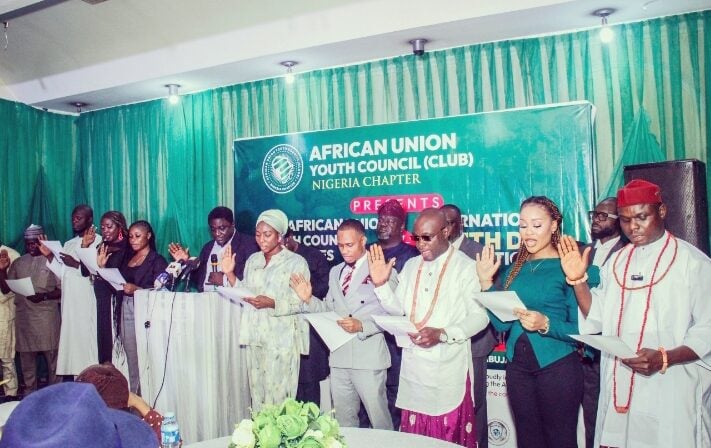The President of the African Union Youth Council (Club), Amb. Dr. Louis Temisan has called on African youths to spearhead prosperity, innovation, and knowledge-driven transformation across the continent.
Amb. Temisan made the charge during the inauguration of the Executive Members of the African Union Youth Club, held in Abuja yesterday, in commemoration of International Youth Day 2025. The event was themed: “Youth Actions for the SDGs and Agenda 2063 – The Future of Africa.”
He emphasised that the gathering represents the collective spirit and commitment of young people eager to shape their destinies and build the Africa of tomorrow.
“Africa is a continent on the rise. With over 60% of its population under 25, it is home to the world’s youngest population. However, approximately 76 million young people are not engaged in formal employment, education, or training (NEET),” he stated.
While 10 to 12 million youths enter the labour market annually, only about 3 million formal jobs are created, leaving a vast gap. Many young Africans also face significant barriers to entrepreneurship, struggling to access the skills, capital, and networks necessary for success.
“The high number of youth excluded from economic and political activities highlights the critical challenge of youth disempowerment on the continent,” he said. “It is vital to include young people in decision-making and provide them with the opportunities to work, lead, and innovate.”
Amb. Temisan stressed that engaging young people is central to successfully implementing Africa’s transformative agendas. Achieving these aspirations requires deeply understanding African youth’s needs, challenges, and potential.
“We must strengthen meaningful youth engagement in policy and decision-making processes. This requires institutional reforms, youth networks, and supportive policymakers who genuinely listen to the voices of the youth,” he said.
He further emphasised the need to: Implement inclusive national youth policies that account for diversity and demographic changes;
We must promote investments that harness youth potential in education, health, employment, economy, governance, and civic engagement.
Amb. Temisan noted that economic empowerment starts with quality education and relevant skills. While over 80% of African youths in school aspire to high-skilled jobs, only about 8% secure such employment.
“We need an education system that not only meets today’s demands but also prepares youth for the future—emphasising vocational training, technology, innovation, critical thinking, and entrepreneurship.”
He highlighted the importance of skills training programs and active labour market policies in helping youth integrate into decent, formal-sector jobs.
He emphasised the transformative role of science, technology, and innovation (STI) in empowering youth, particularly in global shifts such as artificial intelligence (AI) and the green transition. These shifts, he said, offer opportunities for inclusive and sustainable growth.
He noted that entrepreneurship remains a powerful driver of job creation, but many young entrepreneurs face barriers such as limited access to finance, mentorship, and networks.
Amb Temisan also stressed the role of the African Continental Free Trade Area (AfCFTA) in opening cross-border opportunities for youth, particularly in high-productivity sectors such as agrifood and climate-smart agriculture.
“AfCFTA can enable African youth to enter more innovative sectors by reducing trade barriers. Empowering youth-led SMEs is key to unlocking the continent’s economic potential.”
He called for at least 7% economic growth rates—preferably double-digit—to ensure sustainable, inclusive, and job-creating development, with STI at the centre of that transformation.
Professor Hephzibah Suobo, Special Envoy for Climate Diplomacy and Multilateral Policy Negotiations, also spoke at the event and emphasised the importance of youth leadership.
“This day is not merely ceremonial—it is a symbolic threshold,” she said. “Among Africa’s 870 million youth under age 35, it is you—the chosen few—who are entrusted with the mantle of generational leadership, strategic voice, and intergenerational diplomacy.”
She called for actionable, scalable, SDG-aligned initiatives that can bridge the historical development gap between the global North and South.
“Africa must equip her youth to be fit for purpose in a new era of global challenges and innovation. We must tap into innovation ecosystems, transform data into development, and turn information into indigenous technology.”
“African youth are not just future leaders—they are today’s trailblazers, innovators, and changemakers.”
We’ve got the edge. Get real-time reports, breaking scoops, and exclusive angles delivered straight to your phone. Don’t settle for stale news. Join LEADERSHIP NEWS on WhatsApp for 24/7 updates →
Join Our WhatsApp Channel










